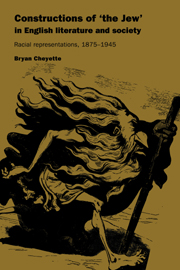Book contents
- Frontmatter
- Contents
- Preface
- Acknowledgements
- 1 Introduction: semitism and the cultural realm
- 2 The promised land of liberalism: Matthew Arnold, Anthony Trollope and George Eliot
- 3 Empire and anarchy: John Buchan and Rudyard Kipling
- 4 The ‘socialism of fools’: George Bernard Shaw and H. G. Wells
- 5 The limits of liberalism: Hilaire Belloc and G. K. Chesterton
- 6 Modernism and ambivalence: James Joyce and T. S. Eliot
- 7 Conclusion: semitism and the crisis of representation
- Bibliography
- Index
1 - Introduction: semitism and the cultural realm
Published online by Cambridge University Press: 19 October 2009
- Frontmatter
- Contents
- Preface
- Acknowledgements
- 1 Introduction: semitism and the cultural realm
- 2 The promised land of liberalism: Matthew Arnold, Anthony Trollope and George Eliot
- 3 Empire and anarchy: John Buchan and Rudyard Kipling
- 4 The ‘socialism of fools’: George Bernard Shaw and H. G. Wells
- 5 The limits of liberalism: Hilaire Belloc and G. K. Chesterton
- 6 Modernism and ambivalence: James Joyce and T. S. Eliot
- 7 Conclusion: semitism and the crisis of representation
- Bibliography
- Index
Summary
Jews have no beautiful philosophy of life, but they are sympathique.
Oscar Wilde, cited in Oscar Wilde (London, 1989) by Richard Ellmann, p. 547Jew-mania was the one evil which no one foretold at the close of the last war … [N]o prophet, so far as I know, had foreseen this anti-Jew horror, whereas today no one can see the end of it. There had been warnings, of course, but they seemed no more ominous than a poem by Hilaire Belloc.
E. M. Forster, ‘Jew-Consciousness’ (1939), collected in Two Cheers for Democracy (London, 1951), p. 25Any study of the representation of Jews in English literature and society is peculiarly fraught with difficulties. The recent prolonged and often heated debates on whether or not the life and work of the literary critic Paul de Man and the philosopher Martin Heidegger were complicit with Nazism shows the extent that, even in the academic community, a largely repressed European past still has the capacity to return and haunt the present. Zygmunt Bauman, with reference to the discipline of Sociology, has shown that the Holocaust has been systematically marginalized and belittled in relation to social theories of modern civilization. With no less culpability, the humanities have also failed to engage with the implications of a post-Holocaust understanding of European civilization.
- Type
- Chapter
- Information
- Constructions of 'the Jew' in English Literature and SocietyRacial Representations, 1875–1945, pp. 1 - 12Publisher: Cambridge University PressPrint publication year: 1993



